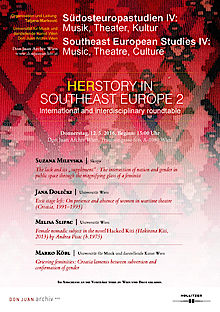Southeast European Studies IV: Music, Theatre, Culture
Herstory in southeast Europe
International and interdisciplinary roundtable
12. Mai 2016
Don Juan Archiv Wien, Beginn: 15:00
Organisation und Leitung: Tatjana Marković (Universität für Musik und darstellende Kunst Wien, Don Juan Archiv Wien)
Herstory is embedded in the interdisciplinary and theoretical context of Gender and Women’s Studies. Poststructuralism brought new perspectives and interpretations to the text, among them an awareness of the politics of identity and the discovery of subordinated feminine voices as a critique of conventional patriarchal historiography. Herstory challenges the lack of gender balance in the canon and sheds light on the creative contributions of marginalized women. Unlike literary studies, where the discipline of Gender and Women’s Studies was first developed, awareness of gender issues is relatively new in musicology, entering the field with the turn towards a new or cultural musicology in the 1980s.
On this occasion, herstory will be introduced as a part of Balkan Studies with an exploration of the visual presentation of women in public space in the context of national(istic) political self-representation and actual Colorful Revolution in Skopje, female perspectives in literature (theatre, novel) during and after the wars following dissolution of Yugoslavia in the 1990s and in traditional/ritual music in southeast Europe. The voices of female authors, theater and music performers and the voices of female characters in literature shed light on the process of women’s transition from a marginalized minority to a rising alternative mainstream. The four presentations will be delivered in English.
Programm
15:00
Tatjana Marković (Universität für Musik und darstellende Kunst Wien, Don Juan Archiv Wien)
Herstory and southeast European studies, introduction
15:15–16:00
Suzana Milevska, (Skopje)
The lack and its “supplement”: The intersection of nation and gender in public space through the magnifying glass of a feminist
16:00–16:45
Jana Dolečki (Universität Wien)
Exit stage left: On presence and absence of women in wartime theatre (Croatia, 1991–1995)
16:45–17:00
Pause
17:00–17:45
Melisa Slipac (Universität Wien)
Female nomadic subject in the novel Hacked Kiti (Hakirana Kiti, 2013) by Andrea Pisac (b. 1975)
17:45–18:30
Marko Kölbl (Universität für Musik und darstellende Kunst Wien)
Grieving femininities: Croatian laments between subversion and confirmation of gender
18:30
Im Anschluss an die Vorträge wird zu Wein und Brot geladen.
